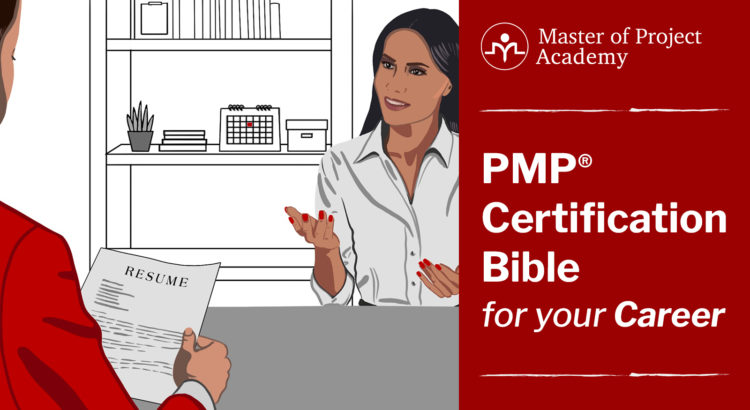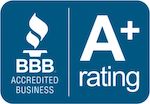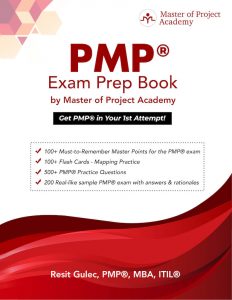Since 2012, Master of Project Academy has been guiding aspiring leaders to conquer the PMP Certification. We have helped over 300,000 professionals achieve this goal with an impressive 99.6% passing rate on their first try. Now, we’re offering you our ultimate guide, the “PMP Certification Bible,” to make sure you’re ready to have a successful PMP journey!
PMP Certification Bible
Table of Contents:
- What is PMP Certification?
- What are the benefits of PMP Certification?
- What are the PMP Certification Requirements?
- What is the PMP Exam Structure?
- What is the PMP Exam Passing Score and PMP Exam Pass Rate?
- How can I apply for PMP Certification?
- How can I pass the PMP Application Audit?
- What is the PMP Certification Cost?
- How Should I Study for the PMP Certification Exam?
- What is the PMP Exam Schedule? When is the next PMP exam date?
- Can I Prepare for PMP Certification Online?
- What is the best way to study for the PMP Exam?
- How should I choose my PMP Certification Training?
- What Should I study for my PMP Certification Exam?
- What Are the Latest PMP Exam Changes?
- What are the Key Points of PMBOK 6th edition?
- What are the Key Points of PMBOK 7th edition?
- What are the Key Points of the Agile Practice Guide?
- Should I follow other PMP Prep Books during my Study?
- Question Selection and Content
- Should I use PMP Exam Simulators?
- How Should I Use PMP Cheat Sheets?
- What are the PMP Certification PDU Requirements?
- How can I earn PMP PDU?
- How can I renew my PMP Certification?
- How can I earn FREE PMP PDUs?
- How can I earn PDUs from PMP PDU Courses?
- How Much Do Project Managers Earn?
- How Much Can a PMP Certified Project Manager Earn?
- Conclusion
Let’s break it down step by step!
We’ve covered everything about PMP certification in this bible, from what it is to all the nitty-gritty details. Plus, we’ve based it on the 25+ most frequently asked questions our PMP certification hopefuls gathered through our customer support channels. In short, you will learn a lot and we will clarify all questions you have about PMP certification in this post.
⚠️ Important Note: This resource is completely free, and you will find various information about PMP Certification and the PMP exam throughout the post. DO NOT JUST SKIP THE POST. Otherwise, you can miss important videos, free resources, and other valuable information for your PMP study.
Even though I encourage you to read this post carefully, you might feel that you already know a lot about certain topics. That is why I prepared the following table of contents. So, if you wish to skip to a particular topic, go ahead and use it – just keep in mind that you might miss some free resources if you jump around too much🤔.
Attend our 100% Online & Self-Paced One-Hour Free PMP Training.
What is PMP Certification?
The first thing I will talk about is what the PMP certification is. PMP stands for Project Management Professional. PMI Institute provides PMP certification to the professionals who meet the PMP eligibility requirements and pass the PMP certification exam.
PMI (Project Management Institute) was founded in 1969, in Pennsylvania, US by five volunteers who worked in the field of project management. But it wasn’t until 14 years later, in 1983, that they organized their first symposium in Atlanta, Georgia. That first event had 83 professionals attending.

PMI institute had a big goal: to create a universal language for project management worldwide. They decided the best way to do this was by having a certification exam and teaching candidates a common project management language.
The first PMP certification exam was held at PMI ’84 in Philadelphia on October 6, 1984. Out of those who took the exam, 43 individuals passed and became the first-ever Project Management Professionals (PMPs). Since then, the importance and reputation of PMP certification increased gradually. Today, no doubt, PMP is the most prestigious project management certification globally and there are millions of PMP certification holders around the world.
Watch “What is PMP Certification” Video:
As the importance of PMP certification grew, PMI institute published PMBOK (Project Management Body of Knowledge) series to establish a common language of project management. This also helped PMP certification exam candidates know what to expect on the exam.
The first PMBOK was published in 1996 followed by versions 2 through 7 published in 2000, 2004, 2009, 2013, 2017, and 2021 respectively. Every four to five years, PMI prepares a new version of the PMBOK to reflect changes in the project management field and industry trends. The latest is PMBOK 7th edition, which was published in 2021.
Recap of this section: PMP stands for Project Management Professional and is awarded by PMI Institute to the applicants who meet the requirements and pass the exam. You can read more about PMP certification in our What is PMP post.
What are the benefits of PMP Certification?
There are many advantages to getting PMP certification. Here, I will focus on the top three benefits. These are common language of project management, better salary, and advantage in job screening.
1- Common Language Benefit of PMP Certification in Project Management World
This is what the PMI institute aims for. Project management discipline is not industry-specific. No matter in which industry you are working, projects are crucial business drivers that help companies to operate and survive in their market. When working with your colleagues, partners, suppliers, or employees from another company, you need to speak the same language when it comes to projects. It’s like trying to communicate with someone who speaks a different language—if you don’t understand each other, it’s tough! Project management professionals must be able to understand each other. When a colleague says “scope”, “change request”, “risk register”, “issue log” etc. other project management professionals must understand what they are referring to.

PMP certification ensures that all certified professionals speak the same project management language. This makes it easier to communicate and manage projects around the world. Project management professionals understand the value of Project Management Plans. Project Management Plans are like Business Plans in that they determine the success or failure of projects. Check out Master of Project Academy’s exclusive “Sandbox,” membership which includes example project management plans that accompany case studies and a template for developing project plans.
2- Higher Earnings with PMP Certification
The biggest benefit of PMP certification is the value it brings to you as an individual. PMP-certified professionals typically earn up to 20% more than those without certification. In the US specifically, our research shows that PMP certification holders earn around 14% more than regular project managers who aren’t certified.
In the US, a PMP certified project manager earns about $110,000 per year. This amount can vary depending on the industry, experiences, and skills of the project manager. But that’s the average salary we’ve found in our research.
If you’re curious about how much you could earn with PMP certification, we’ll dive into that in more detail under the headings “How much do Project Managers earn?” and “How much a PMP Certified Project Manager can earn?”
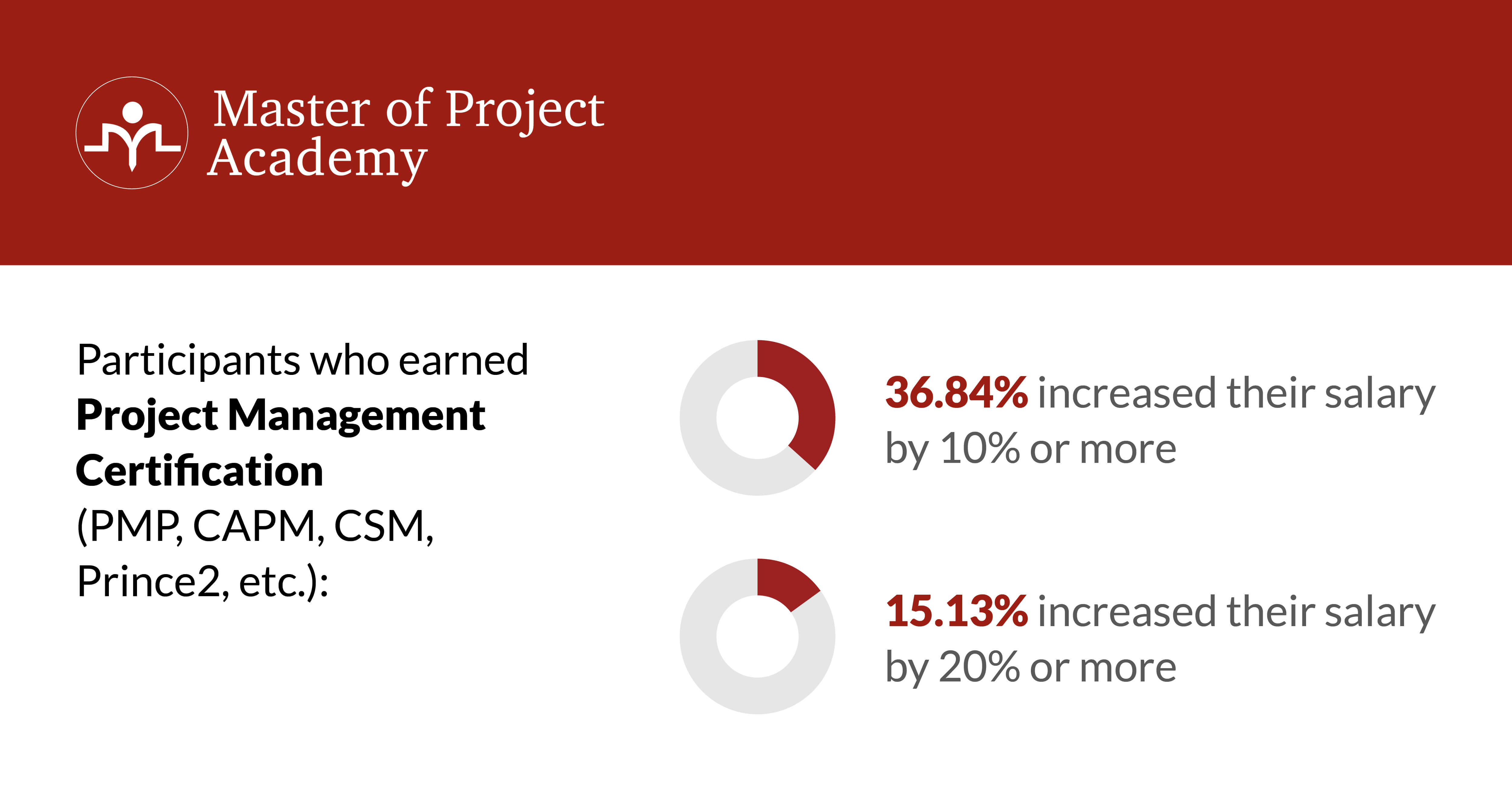
3- Advantages of PMP certification in Job Screening
When you’re on the hunt for a project management job, especially in top-notch companies, having the PMP certification can be a game-changer. Let me show you what I found:
While writing this post, I did a quick search for “project manager”, “technical project manager”, “enterprise project manager”, and “senior project manager” jobs in the United States on LinkedIn. Here’s what I discovered about PMP in these job postings.
- Position: Project Manager (Link to job search)
- Position: Technical Project Manager (Link to job search)
- Position: Enterprise Project Manager (Link to job search)
- Position: Senior Project Manager (Link to job search)
When browsing positions, use the following tips to find positions that mention PMP Certification:
In the “desired skills & experience” section, look for: “PMP (Project Management Professional) Certification required.”
In the “requirements” section, look for: “PMP Certification strongly desired.”
In the “preferred qualifications” section, look for: “PMP Certification desired”.
In the “requirements” section, check for: “Achieved a PMP or/and Certified Scrum Master or other project management certification.”
Also, feel free to narrow the filter using location, years of experience, salary, etc.

There were thousands of job postings and most of them required PMP certification as a critical requirement. Can you imagine passing the screening of these companies without having PMP certification? Especially in today’s harsh competition, it is almost impossible. That’s why having a PMP certification gives you a serious edge over other candidates when applying for project management jobs.
Recap of this section: PMP certification guarantees a shared language among project management professionals around the world. The top benefits of PMP certification for an individual include a salary increase and better chances of getting a project management job. You can read more in our dedicated PMP benefits post.
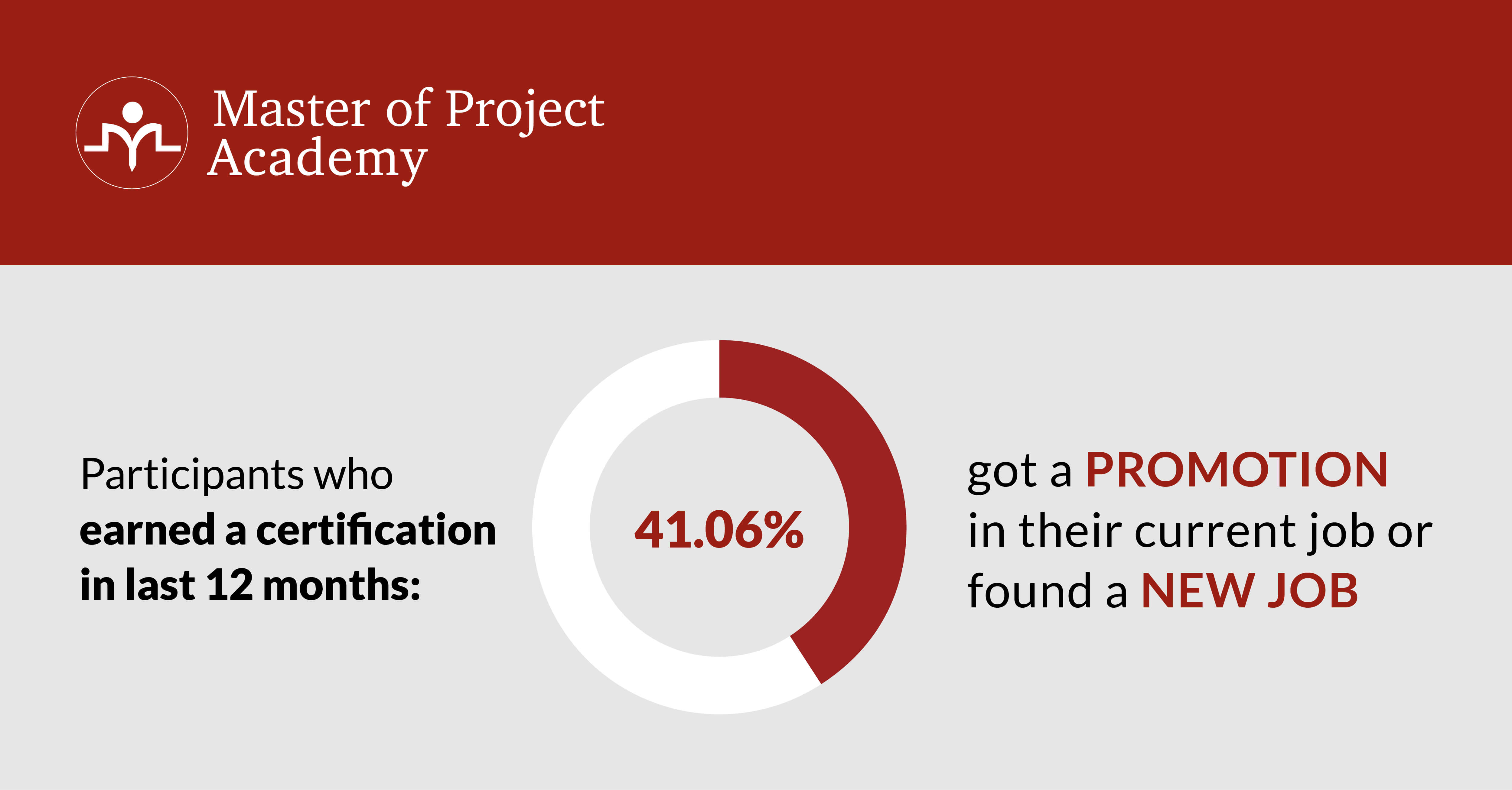
What are the PMP Certification Requirements?
You have seen the three major benefits of PMP certification above, and now you are considering getting PMP certification. But are you eligible to take the PMP certification exam? PMI has specific eligibility requirements for the PMP certification, categorized in two areas. The first one is project management experience, and the other one is project management education.
Watch the following video to learn about PMP certification requirements.
Let us examine these 2 requirements one by one.
1- PMP Certification Project Management Experience Requirement
To be eligible for the PMP certification exam, you need to have hands-on experience working on projects. The required experience varies based on your level of education:
- If you have an undergraduate or above level of education, you must have 3+ years of project experience (4,500 hours)
- If you have a high school diploma or lower level of education, you must have 5+ years of project experience (7,500 hours).
PMI wants to ensure that PMP candidates have both theoretical knowledge and practical experience.
There is a common misconception about the project management experience of PMP certification eligibility requirements. Many people think that in order to be eligible for PMP certification, they must have managed a project. However, PMI clearly states that project management experience here means participating in a project and this might or might not be a leading role. If you have worked as a Business Analyst, Software Developer etc. in an IT project, or if you worked as a civil engineer, architect etc. in a construction project, you meet the project management experience requirement for PMP certification.
2-Project Management Education Requirement
If your project management experience aligns with your education level, you’ll also need to complete 35 contact hours of project management education to qualify for PMP certification. Here’s what that means: the term “contact hours” refers to instructional hours, meaning self-study with PMP materials or PMBOK won’t count towards this requirement.
To fulfill the 35 contact hours requirement, you can choose from various options:
- Attend a PMP classroom training,
- Participate in a PMP live classroom training, or
- Complete an online & self-paced PMP training.
You don’t have to get all 35 contact hours from a single training. You can accumulate them from multiple sessions. Just make sure the total hours add up to at least 35. Also, keep in mind that all the PMP training sessions must have taken place within the last five years from the time you apply for PMP certification.
We have created a quiz that will evaluate your project management experience, education level, and contact hours eligibility to determine whether you are eligible to take the PMP certification exam.
✅ Take PMP Certification Eligibility Quiz
Recap of this section: If you have an undergraduate degree or higher, you need at least 3 years (4,500 hours) of project management experience. If you have a high school diploma or lower, you’ll need 5 years (7,500 hours) of project management experience.If you meet the required project management experience for your education level, you also need to have completed 35 contact hours of project management education within the last five years when applying for PMP certification. You can learn more about this in our PMP requirements post.
What is the PMP Exam Structure?
Once you have met the PMP eligibility requirements and completed your PMP preparation, you can schedule your PMP exam through a Pearson VUE prometric test center. You can find the nearest PMP exam test center on the following Pearson VUE website.
During your PMP exam, you will have 230 minutes to answer 180 questions. Note that five of these questions are for quality measurement purposes by PMI and they are not scored. However, you will not be told which questions are scored or not, so it is crucial to take each PMP exam question seriously.
The exam will feature questions that address predictive, adaptive, and hybrid project approaches, testing the project manager’s understanding across the three domains of People, Processes, and Business Environment. These questions will come in different formats, including multiple-choice, multiple response, matching, hotspot, and fill-in-the-blank. If you’re unsure about an answer or want to review it later, you can mark it. Then, you can go back and review your marked questions before completing your PMP exam.
Following is a sample PMP exam question.
A manager and the head of engineering discuss a change to a major work package. After the meeting, the manager contacts you and tells you to complete the paperwork to make the change. This is an example of:
A-) Management attention to scope management.
B-) Management planning.
C-) A project expediter position.
D-) A change control system.
The newest PMP exam includes more scenario-based questions which effectively assess candidates’ adaptability and soft skills.
Recap of this section: There are 180 multi format questions in the PMP exam, and you will have 230 minutes to complete the exam. The exam is administered by Pearson VUE testing centers.
What is the PMP Exam Passing Score and PMP Exam Pass Rate?
When taking your PMP exam, you will answer 180 multi-format questions in 230 minutes. But how many correct answers do you need to pass and earn your PMP certificate?
Many courses, blog posts, books, and several authorities suggest that a passing score for the PMP is 61%. However, this figure is not an official passing score declared by PMI.
PMI will assess your PMP knowledge in three domains and you must score above expected levels to pass the PMP exam. You can see a sample PMP exam result report below.
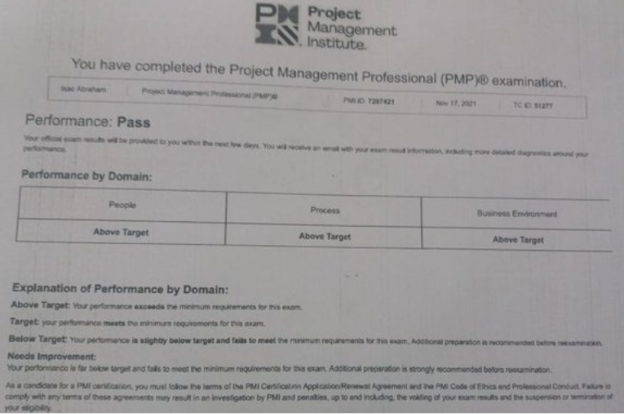
As you can see in the report, there’s no percentage indicating the number of correct answers. Instead, it assesses performance across the three domains of the PMP exam, indicating whether the score is above or below expected levels.
While there isn’t an official passing score for the PMP exam, I highly suggest aiming for at least an 80% score on each PMP practice quiz or exam you take. This will significantly increase your confidence and chances of passing the PMP exam.
Recap of this section: There isn’t an official passing score issued by the PMI for the PMP exam and 61% is a myth rather than a fact. PMI assesses PMP exam candidates across three domains and the PMP exam score demonstrates whether the exam taker scored above or below target. You can read more in our PMP exam pass rate post.
How can I apply for PMP Certification?
You can watch the following video to learn more about PMP certification application methods.
These days, you can only apply for PMP certification online. To begin, you’ll need to create a profile on the PMI website (pmi.org). The PMP application wizard will then walk you through filling in the following details:
- Personal Information (Name, Email, Address, etc.)
- Educational Background
- Project Management Experience
- Project Management Education (PMP Prep Training Course)
You can enroll in our FREE PMP Training to learn more about PMP application steps through a real PMP application.
Recap of this section: You can only apply for the PMP certification online. You can read more about the application steps in our PMP application post.
How can I pass the PMP Application Audit?
PMI randomly selects some PMP applications for audit regardless of their completeness. If your PMP application is audited, you may need to provide one or more of the following documents:
- Diploma or equivalent document demonstrating your education level.
- Reference letters from your colleagues, supervisors, or managers to verify your project management experience.
- Certificate of completion, letter of enrollment and/or curriculum from your project management education.
If your PMP application is audited, you are responsible for providing the education and project management experience documents. However, if PMI requests documentation for your project management education, you have to contact your PMP training provider who must provide the necessary documents to pass the PMP audit.
You can learn more about the PMI Audit Process by watching this video.
PMI Audit Process
Once you have gathered the necessary documents requested by PMI, you have to send them by regular mail to the following address within 90 days of receiving the PMI audit email.
PMI
Attn: Certification Audit
14 Campus Blvd. Newtown Square, PA 19073-3299 USA
PMI will review the documents and if they meet the PMP eligibility requirements, your PMP application will be approved.
Recap of this section:
It’s recommended to apply for PMP certification online. PMI audits PMP applications randomly. Even if you completed your PMP application perfectly, your PMP application might still be audited. However, once you provide the required documents, PMI will approve your PMP application. You can read more about it in the PMI Audit post.
What is the PMP Certification Cost?
I divide the cost of PMP certification into two categories:
- Tangible PMP Certification Cost (training and exam fees)
- Intangible PMP Certification Cost (time spent studying)
The tangible costs include expenses such as PMP certification training fees and the PMP certification exam fee. Additionally, as a professional, you will spend a significant amount of your time on PMP certification preparation. I consider the time spent studying for your PMP exam as an intangible cost of PMP certification.
Let’s examine each of these costs one by one.
1- PMP Certification Training Cost:
One of the main requirements for PMP certification is completing a 35 contact hours project management training. There are three primary methods for attending this training: classroom training, live classroom training and online self-paced PMP training. Your choice of training method will impact the cost of your PMP training and, consequently, the overall cost of PMP certification for you.
Course fees for PMP classroom training vary depending on the location. I listed the starting fees of PMP classroom training for different locations.
- US, Canada, Australia: ~1,500 USD
- South America (Brazil, Chile, etc.): ~600 USD
- China, India: ~500 USD
- European Countries (Germany, Italy, Spain, etc.): ~1,200 USD
- Arabian Countries (UAE, Qatar, Saudi Arabia, Kuwait, etc.): ~2,000 USD
The course fees for live classroom training are slightly lower than those for regular classroom training. Additionally, the prices of live classroom trainings are generally aligned with the regular classroom training fees for each country.
The third and most affordable option is online PMP training. With online self-paced PMP training, you have the flexibility to follow lectures at your own pace and from any location, as long as you have an internet-connected device. Prices for online self-paced PMP training start as low as $67 per month.
However, the most significant advantage of online PMP training isn’t just the affordable pricing. Most PMP certification aspirants are working professionals trying to get this certification while they are working full- time jobs. In other words, they have to spare their evenings, weekends or must get off days from work to attend classroom training. Even if they manage to adjust their schedule to fit the classroom training schedule, enduring a four full-day project management training can be challenging. Therefore, online self-paced PMP training is the optimal method for attending PMP training.
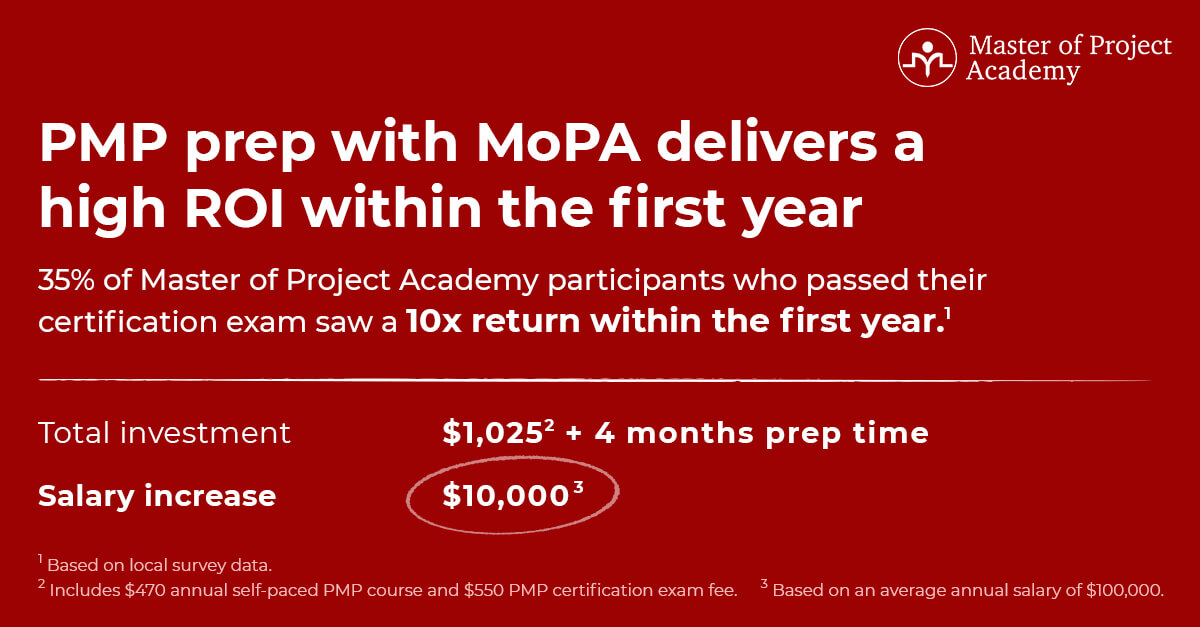
Brianna summarized the top 3 benefits of PMP Online Training in the following Two-Minutes Video
2- PMP Certification Exam Fee
Once you’ve completed and submitted your PMP application form, PMI will review it within five business days.
If PMI approves your PMP certification application, you will need to take the PMP certification exam within one year of the approval day. To schedule your PMP exam date, you’ll need to do so through Pearson VUE test centers, which you can access via the PMI website. Before scheduling your exam, you’ll need to pay the PMP exam fee.
| PMP Examination | PMI Member Examination Fees($USD) | Non-PMI Member Examination Fees(USD) |
| PMP Exam – First Time Fee | $405 | $575 |
| PMP Reexamination Fee | $275 | $375 |
The PMP exam fee is $405 for PMI members and $575 for non-members. However, considering that PMI membership is around $140, you’ll end up paying more for the exam ($575) if you’re not a member. Therefore, I strongly recommend paying for the PMI membership.
Additionally, as a PMI member, you’ll have access to PMI documents, including the PMBOK, for free for one year. The standard PMI membership fee is $139, with a one-time $10 membership application fee. Discounted membership fees are available for students or retirees.
| Membership | PMI Membership Fees($USD) | Note |
| Standard | $139 | Plus, a one-time US$10 application fee |
| Student | $32 | |
| Retiree | $65 |
Therefore, opt for the PMI membership when applying for your PMP exam to enjoy one year of free access to the PMI library, which includes the PMBOK Guide 7th edition, Agile Practice Guide, and many more resources relevant to your PMP study.
3- Time Spent for PMP Certification Study
The time you spent on your PMP study represents the intangible cost of the PMP certification. This will vary depending on your background and familiarity with the project management.
However, considering the 35 contact hours of project management training you will attend, you can expect to spend roughly two to three times more studying for PMP certification training. We will dive into the details of PMP preparation time in the PMP study plan section of this post.

Recap of this section:
PMP certification cost varies depending on your location and your preferred method of receiving project management education. If you opt for a PMP classroom training, prices may reach up to $3,000. However, if you opt for an online self-paced PMP training, your total PMP certification cost will be around $750. Online self-paced PMP training is not only affordable but also flexible and you can follow the lectures at your own pace from anywhere. In addition to the financial cost of PMP certification, you will need to allocate approximately 70-85 hours in total for your PMP certification study.
You can read more in our PMP exam cost and PMP exam fee posts.
How Should I Study for the PMP Certification Exam?
Now that you understand what the PMP certification entails and have determined your eligibility and the associated costs, it’s time to prepare your own PMP study plan.
PMP preparation takes a significant amount of time. Especially if you are a working professional, allocating your leisure time to get ready for the PMP certification exam is essential. Therefore, you have to prepare a solid and good PMP study plan to pass the PMP certification exam.
Having assisted 200,000 professionals in passing their PMP certification exams, we’ve developed a 7-step PMP study plan tailored for working professionals. Let’s go through each step of a successful PMP study plan.
1-Determine the Target Date for your PMP Exam
Evaluate your current schedule and your workload for the upcoming months to determine how much time you can dedicate to PMP study. Based on our experience, a typical PMP certification study requires around 70-85 hours in total. However, this is just an average and depending on your background and skills, your PMP study can take shorter or longer.
A working professional may be able to allocate six hours per week for the PMP study totaling 10-12 weeks for PMP study. Therefore, setting your PMP exam target date two to three months ahead would be reasonable.
2-Prepare Your PMP Study Plan
After setting your PMP exam target date, prepare a detailed plan on what you will study each week leading up to the exam. Considering the current PMP Exam Content Outline you might need to review multiple textbooks, such as the Agile Practice Guide and PMBOK 6th and 7th editions. The PMBOK 6th edition comprises project management knowledge areas and introductory sections that are instrumental in mastering questions related to the domain of Processes. This domain encompasses 50% of the total number of questions on the PMP Exam. Therefore, familiarizing yourself with the content of the PMBOK will greatly enhance your preparation and performance on the exam.
The content of each textbook is different. However, roughly, aim to complete a couple of sections or areas per week. Some of the sections will take longer to complete while some of them are shorter. Also, some weeks might be busier at work, making it difficult to dedicate enough time for your PMP study. However, if you aim to complete a couple of sections or knowledge areas per week, it will help you to complete your PMP study in two to three months in total. Adjust your study plan as needed to accommodate any unexpected changes in your schedule or workload.
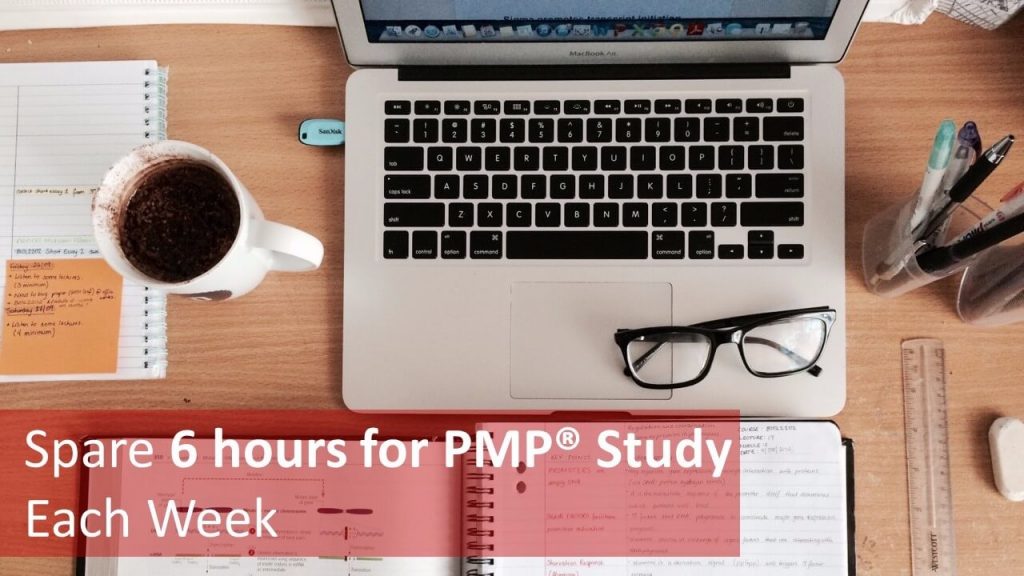
3- Take Notes During Your PMP Study
During your PMP certification exam preparation, you will see lots of terms, concepts, formulas, and other information that need to be remembered. Since PMP study might take several months, it will be ideal to take your notes during your PMP preparation. As you complete new sections or knowledge areas, you can go over your notes to remember the sections you have already completed. This will help you to keep your knowledge fresh and recall the information during the exam.
4- Practice as Much as Possible
This is a tip that is not exclusive only to the PMP certification preparation. No matter which exam you are studying for, practicing as much as possible will help you see various question formats and scenarios that you may encounter in the real exam. The same rule applies for the PMP exam as well and this will increase your PMP exam success respectively.
5- Go Through Your Wrong Answers
As you work through PMP exam practice questions, take notes on any incorrect answers. Go over your incorrect answers and take notes on why you made a mistake. If you have lots of wrong answers on a particular section or knowledge area, it will be good to review the section once again. This approach will help you identify your weaknesses, boost your understanding of key concepts and increase your chances of success on the exam.
6- Go Through Your Notes Frequently
You will need to study for several months to get ready for the PMP exam. It is also important to remember what you learned months ago. The best way to do this is to go through your notes frequently. Dedicate 30 minutes of your weekly PMP study sessions to go over your notes to review the sections you have completed already. We will talk about how you can use PMP Flash Cards as a tool to memorize your PMP knowledge during your PMP study.
7- Go and Get the PMP!
You have completed all sections and knowledge areas, reviewed all necessary textbooks, and scored over 70% on the sample PMP exam questions. You feel confident to take the PMP exam.
Schedule your PMP exam date through the Pearson VUE test center. Do not study hard during the last week of your PMP study. Just briefly review your PMP notes each day to remember the content. This will help you remember the content without being overwhelmed before the exam. Relax, and be confident in your knowledge as you approach the exam day.

Before the exam date, take a good night’s sleep and relax. Plan to arrive at the exam center one hour before your PMP exam time to allow for any traffic delays or other unexpected situations.
Recap of this section:
PMP certification requires significant amount of time to study. Prepare a solid plan and follow your plan to be successful on your PMP certification exam. You can get more detailed information about each of these steps in our PMP study plan post.
What is the PMP Exam Schedule? When is the next PMP exam date?
Many PMP aspirants often wonder about the PMP exam schedule, asking questions like “When is the next PMP exam date?” The simple answer is:
You can take your PMP exam on the date you choose.
There isn’t a fixed PMP exam schedule or specific exam dates that you must follow.
Here’s how it works: First, you apply for the PMP certification exam, and PMI reviews your application. There are three possible outcomes: approval, audit, or rejection, as mentioned earlier.
If your application is approved, you will have one year to schedule your PMP exam. PMI collaborates with Pearson VUE test centers to administer PMP exams. After you complete your PMP preparation, you can pay the PMP exam fee and schedule your exam at a nearest Pearson VUE test center.
There aren’t set PMP exam dates. However, the Pearson VUE test centers do not offer only PMP or PMI exams. They offer other tests as well. So, to avoid busy days at the test centers and take your PMP exam on your preferred date, we recommend scheduling your PMP exam date at least one month in advance.
Recap of this section:
There is no fixed PMP exam schedule or set PMP exam dates. You can schedule your PMP exam through your PMI dashboard after your PMP application is approved. You can read more in our PMP exam schedule post.
Can I Prepare for PMP Certification Online?
Absolutely! At Master of Project Academy, we offer various forms of PMP training: in-person classroom, self-paced, and instructor-led. However, since the 2010s, with the evolution of online education, we have seen a big shift from traditional “offline” and “in-person” classes to online study methods. There are three main reasons for this.
1. Flexibility: Professionals can study around their schedule in PMP online preparation methods. This is crucial because many PMP aspirants, like me, when I prepared for the exam, work full-time and need to study after work or on weekends. Previously, without online options, one had to take time off work to attend training. Professionals can study around their schedule with PMP online preparation methods. Now, with online programs, you can work and study whenever it suits you.
2. Technology: Technology improved the delivery quality of PMP online methods. One of the drawbacks of online preparation used to be the lack of interactivity compared to in-person classes. However, technological advancements have minimized this issue. Nowadays, students can receive prompt responses to their questions through discussion forums or emails.
3. Affordability: PMP Certification online preparation methods are significantly more affordable. For example, let’s consider the financial aspects of conducting an in-person PMP classroom training. Suppose there are 10 attendees in a class. We allocate around $1,000 per day for the PMP instructor and approximately $3,000 for the training venue. These costs total around $7,000, making it approximately $700 per student. To cover expenses and sustain the business, the training must be sold for at least $1,300 per student. Nowadays, with online training options, these major costs are minimized, and the prices become significantly affordable.
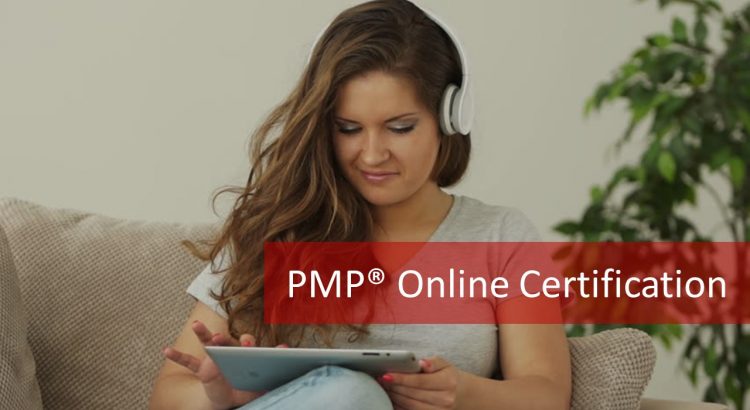
Now, let’s get to the main point – How can you prepare PMP online? There are five steps of earning and maintaining PMP certification online.
- PMP online certification application: We have outlined the options on how you can apply PMP online in previous headings. This is the fastest and most convenient way recommended by the PMI.
- PMP certification online study: There are several resources available online for PMP preparation, both free and paid materials. Just make sure that the PMP resources you use are credible, up to date and meet the PMP requirements.
- PMP online training: The foundational part of your PMP online preparation will be your online training. PMI does not impose restrictions on the form of training, so you can fulfill the 35 contact hours requirement with online training. Before choosing your PMP online training, review the curriculum, course materials, recent student testimonials and ensure the training satisfies the 35 contact hours training requirement for PMP exam.
- Taking PMP exam: You can prepare for the PMP exam online using a virtual or self-paced option. To take the PMP exam, you have two options: Taking the PMP exam in a testing center or online. You yourself will need to choose where to take your PMP exam. At a test center, everything’s set up for you – no tech worries, just focus on passing the exam. On the other hand, online testing means taking the test at home, in a comfortable and familiar environment. Online prep takes more work. You must make sure your technology meets PMI requirements and find a quiet spot with no interruptions.
- PMP certification online renewal: After passing the PMP exam and receiving your certification, you must earn 60 PMP PDUs (Professional Development Units) every three years to renew it. You can fulfill this requirement by attending online PMP PDU courses, webinars, conferences, or other activities.
Recap of this section: You can attend online or in-person PMP training. PMP online certification courses offer flexibility and affordable pricing, making it an attractive option for many professionals. You can read more in our PMP online certification post.
What is the best way to study for the PMP Exam?
When preparing for the PMP exam, it’s important to find the study method that suits you best. Since everyone has different preferences, what works for one person might not work for another.
Here’s how you can determine the best way for you to study for the PMP exam.
The first step is determining your PMP training method. There are three main options: classroom training, live classroom training, and online self-paced PMP training. Let’s examine the pros and cons of each PMP training method one by one.
1-PMP classroom (in-person) training is a traditional way of attending a PMP training
If there is a PMP training provider in your city that organizes public PMP in-person training check their schedules to see if they fit your agenda. If you like face-to-face interaction, PMP classroom training will be the best option for you. However, many professionals find it challenging to adjust their schedule for a PMP classroom training. The main reason is, PMP classroom training is organized during evenings after work or on weekends to ensure the maximum engagement of working professionals. However, attending an intensive 35 hours PMP training after work or during weekends can mean sacrificing leisure time. Here is a summary of the pros and cons of in-person PMP classroom training.
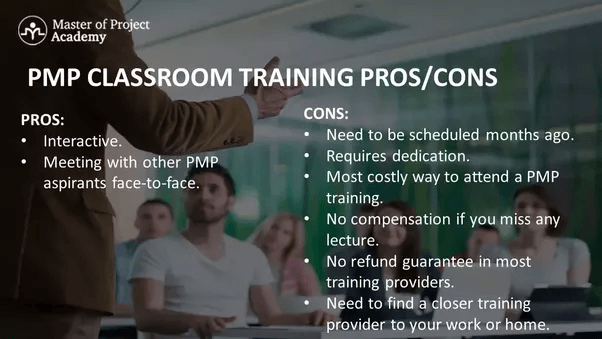
2- PMP live classroom is similar to the PMP classroom training in terms of scheduling
However, the key difference is that a PMP instructor teaches the class through online platforms (webinar, teleconference, etc.). The PMP training participants must be present on their computers during the lectures. The PMP candidate must align their schedule to the timing of PMP live classroom training. Here is a summary of the pros and cons of instructor-led PMP online class training.
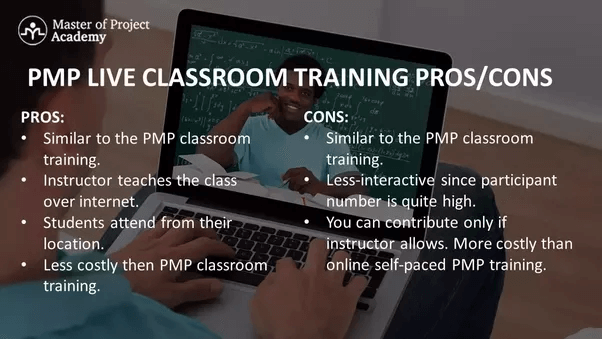
3- Online self-paced PMP training is the most convenient way to attend a PMP training.
In online self-paced PMP training, all PMP content is recorded, and you will be able to watch the same lectures over and over again until you feel confident. The only disadvantage of online self-paced PMP training is the absence of a live PMP instructor, which means your questions may go unanswered. However, in responsive courses like ours at Master of Project Academy, you can get responses to your questions posted in the discussion forum within 24 hours. This makes the online self-paced PMP training the most affordable and convenient way to study for PMP certification exam. Here is a summary of the pros and cons of self-paced online PMP training.
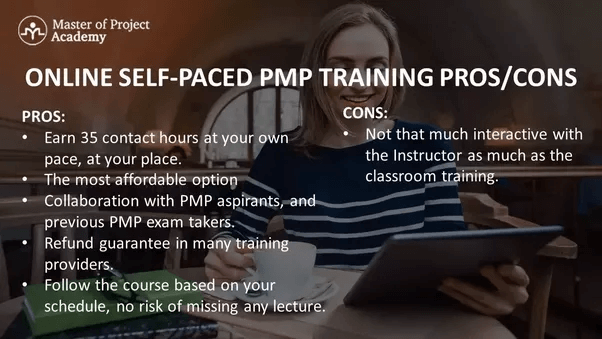
One of the most common questions we receive from our PMP certification aspirants is, whether they have to study PMBOK or any other PMP prep book as well. I will explain this question in more detail in the next sections. With the tips provided for selecting your PMP training and creating your study plan, you’ll need to chart your own path to PMP success!
Recap of this section:
There is no one-size-fits-all approach to PMP study methods. You have to find your own best way to study for the PMP certification exam.
How should I choose my PMP Certification Training?
We have outlined the pros and cons of offline and online PMP certification study methods. You know that you must attend 35 contact hours of PMP training to satisfy the PMI exam requirement and to get ready for the PMP exam. The next question is, how should I choose my PMP certification training?
We are a training company providing all forms of PMP training: in-person, self-paced, and live classes. We have helped 200,000 professionals in more than 180 countries prepare for the certification exams. With our significant experience and close insight into the industry, I would recommend following the steps below to choose your PMP training.
1- Determine what form of PMP Training you would like to attend
There are three main forms. In-person, self-paced or live class. Some of the training providers make blended options such as live class+self-paced or in-person+self-paced as well. Some PMP aspirants prefer in-person method while others feel more comfortable with online method. You should decide which PMP training option suits you the best.
2- Search for Alternative PMP Training Providers
If you would like to attend in-person PMP training, options may be limited, especially if you live in a small city. However, there are many online PMP training options available. Here are some search terms to help you find PMP training providers.
- For In-Person PMP Training Options: search for “pmp training” “pmp course” “pmp classroom training” “in-person PMP training” “pmp classroom training” etc.
- For Self-paced PMP Training Options: search for “online pmp training” “online pmp course” “self-paced PMP training” “self-paced PMP course”
- For PMP Live Class Training Options: search for “online pmp class” “pmp live training” “instructor-led pmp online training”
If a PMP training provider is reputable and credible, you will see the options in the first pages of the search results after your query. Check the options one by one.
3- Check whether the PMP training satisfies the 35 contact hours requirement
There are several PMP training options, particularly online. Make sure the PMP training course you choose satisfies the 35 contact hours requirement for the PMP exam. I am not trying to criticize our competitors, however, there are several training providers who claim that they satisfy the 35 contact hours requirement even though their content may not actually cover the necessary material. For example, I came across a PMP online training program on the web that makes the claim that it satisfies 35 contact hours. Upon closer examination, it seems unlikely to provide sufficient contact hours.
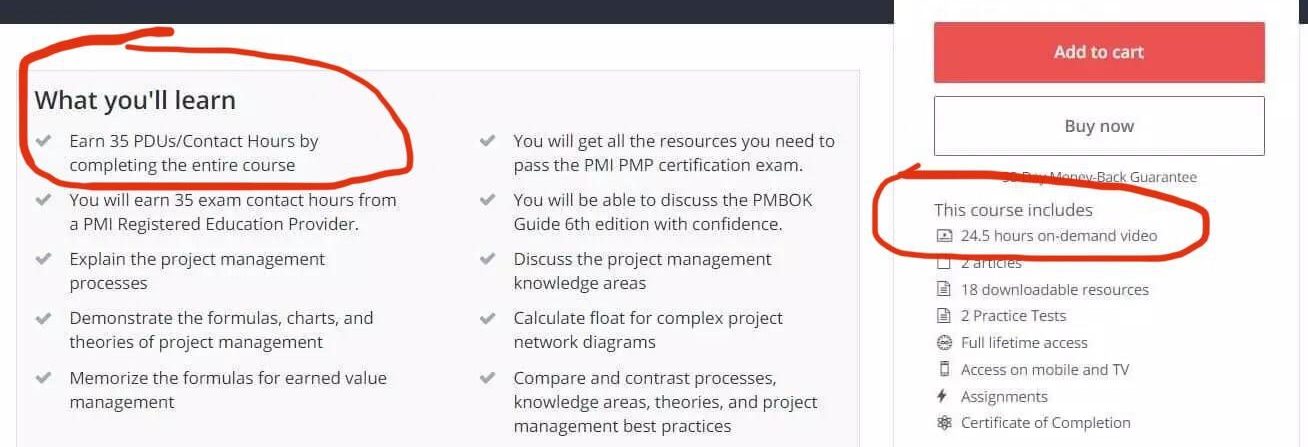
The course content shows that it has 24.5 hours of on-demand video. PMP requirements are clear that, in order to satisfy the 35 contact hours requirement, each contact hour must be “instructional taught by a PMP instructor”. It is important to carefully review the details of any training program to ensure it meets the necessary criteria.
How can I check whether PMP training satisfies the 35 contact hours requirement?
This is easy. You can check the PMP course curriculum and make sure the content covers the PMP Examination Content Outline. Additionally, you can check the legitimate, authentic, and genuine recent reviews of the students from several resources (BBB, Google, Trustpilot, or Facebook). You can ask the PMP training provider about their compliance with the 35 contact hours requirement and recent student testimonials. Make sure the student testimonials are not fake and come from real students.
For instance, we send the following email to our students if they ask whether our courses satisfy the 35 contact hours requirement of the PMP exam.
Our courses are recognized and approved by PMI as a 35 contact hours PM education requirement for PMP and CAPM exams. The following reviews from the students are the proof!
You can continue your study with our courses and get certified on your first attempt.
More than 200,000 professionals from over 180 countries have taken our PMP and CAPM certification courses. They achieved a 99.6% success rate on their first attempt.
I am also sending feedback from recent PMP exam takers along with their LinkedIn profiles:
Don Wheeler – Scored the Highest Grades in PMP Exam
Amber Zhao passed the PMP Exam – Read Her Tips
Lena Adams Two-Minute Video – PMP Exam Story
How did Sanjay pass the PMP in 20 days?
Please let me know if you have any further queries.
Regards
If you have any more questions or need further assistance, feel free to ask. You can also explore the links provided to see authentic reviews from real individuals, along with links to their LinkedIn profiles for verification. Additionally, you can check our A+ rated BBB profile, which demonstrates our legitimacy and credibility as a business, supported by numerous student reviews.
You should see similar footprints if a PMP training provider is legitimate and satisfies the 35 contact hours for the PMP exam.
4- Consider Pricing & Options of PMP Training Options
After you have shortlisted the prospective PMP training options for you, you should consider the pricing and options. Some training providers may offer application guidance, supplementary documents or refund options while others do not. Consider all the pros and cons of each alternative and pick the best option for you.
Recap of this section:
First, determine which form of PMP training you would like to attend and then search for alternatives. Eliminate the options which are not credible or do not satisfy the PMP exam requirements. Shortlist the options and make your final decision based on your needs and preferences.
What Should I study for my PMP Certification Exam?

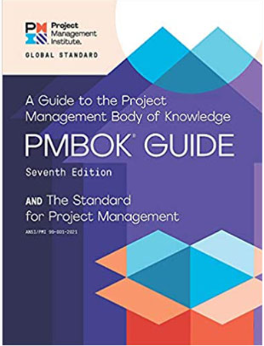
The PMP exam covers topics from several project management books, including the PMBOK Guide 6th Edition, PMBOK Guide 7th Edition, and the Agile Practice Guide, among others. Also, many candidates use supplementary PMP exam prep books during their studies.
If you’re enrolled in a comprehensive PMP training course, in-depth reading of the PMBOK Guides may not be necessary. However, some candidates find it helpful to review the PMBOK for a deeper understanding. There’s no requirement from PMI that you must read the PMBOK to take the exam.
The PMBOK Guide 6th Edition can be challenging to read. While it’s an excellent source of project management knowledge, it focuses heavily on inputs, outputs, tools, and techniques rather than application. If you prefer a more application-focused approach, consider other PMP prep books. These resources often provide better guidance on how to learn the PMP content and pass the exam. Still, the PMBOK 6th Edition is valuable for understanding project processes, so skimming through it and focusing on Part 2, “The Standard for Project Management,” can be beneficial.
The PMBOK Guide 7th Edition is the latest version published by PMI. It covers the entire collection of processes, best practices, terminologies, and guidelines accepted as standards in the project management industry. We will discuss this latest edition in more detail in the next sections.
As general advice, don’t limit your preparation to just the 6th or 7th edition of the PMBOK Guide. This alone won’t be sufficient to pass the exam. Attending a PMP prep course and gaining a solid understanding of Agile and Hybrid Project Management approaches, as covered in the Agile Practice Guide, is also important.
What Are the Latest PMP Exam Changes?
The PMP exam, managed by the Project Management Institute (PMI), changed a lot starting January 2, 2021. These updates reflect the evolving role of project managers and ensure the exam stays globally relevant and compliant with the changing industry dynamics.
Here are the key changes:
The exam now covers three main areas instead of the previous five:
- People (42% of the exam): This section is about managing and leading a project team.
- Process (50% of the exam): This part deals with the technical aspects of project management.
- Business Environment (8% of the exam): This focuses on how projects fit into a company’s overall strategy.
Half of the exam questions now involve Agile and Hybrid project management methods. This change reflects the growing use of these approaches in the industry.
You’ll need to know when to use traditional, Agile, or Hybrid methods based on different project scenarios.
The exam now includes new types of questions to better test your knowledge:
- Multiple-Choice Questions: Pick one correct answer.
- Multiple-Response Questions: Select multiple correct answers.
- Matching Questions: Match items from two lists.
- Hotspot Questions: Click on the correct part of an image or graphic.
- Drag and Drop Questions: Drag items to match or order them correctly.
The exam lasts 230 minutes. It now has 180 questions, down from 200. You’ll get two 10-minute breaks during the exam. You can now take the PMP exam in a testing center or online with a remote proctor, which offers more flexibility.
The PMBOK® Guide (6th Edition) is still important, but the exam also includes information from other sources, such as PMBOK® Guide 7th Edition, and Agile Practice Guide.
To prepare for the updated PMP exam, learn about Agile and Hybrid project management methods, study the new focus areas (People, Process, and Business Environment), practice various question types to get used to the new formats, use updated study guides, practice exams, and training courses.
You can read more in the PMP exam changes post.
What are the Key Points of PMBOK 6th edition?
The PMBOK Guide 6th Edition, published by the Project Management Institute (PMI), is a comprehensive resource outlining the standards and best practices for project management. It is a foundational text for project managers and is widely used for PMP certification preparation.
According to the PMBOK Guide, project management processes are grouped into five process groups:
- Initiating
- Planning
- Executing
- Monitoring & Controlling
- Closing
Each of the project management processes falls within one of these process groups. Additionally, there are 10 project management knowledge areas, also known as PMBOK or PMP knowledge areas. Each process is associated with one of these knowledge areas, creating a structured matrix of process groups and knowledge areas.
The 10 knowledge areas are:
- Integration Management
- Scope Management
- Schedule Management
- Cost Management
- Quality Management
- Resource Management
- Communications Management
- Risk Management
- Procurement Management
- Stakeholder Management
These knowledge areas encompass the processes necessary for effective project management within their respective disciplines. PMI will assess your understanding and application of these areas during the PMP exam. Each knowledge area includes various processes, along with their inputs, tools and techniques, and outputs.
The PMBOK Guide 6th Edition primarily focuses on the technical aspects of managing projects and emphasizes the predictive project management approach. It covers the processes outlined in the Exam Content Outline (ECO). However, relying solely on the PMBOK Guide 6th Edition will not be enough to pass the PMP exam.
What are the Key Points of PMBOK 7th edition?
The Project Management Body of Knowledge (PMBOK) Guide 7th Edition, published by the Project Management Institute (PMI), brings the focus on global project management standards. Unlike previous PMBOK Guides, this edition emphasizes the importance of project management principles and tailoring methodologies to fit the unique needs of each project. It offers a complete guide to help project managers deliver valuable results and become more adaptable and resilient.
A brief overview of the topics covered in PMBOK Guide 7th Edition:
1. Focus on Principles: PMBOK Guide 7th Edition emphasizes core project management principles, offering a holistic view of successful project execution.
There are twelve key principles: Stewardship, Team, Stakeholders, Value, Systems Thinking, Leadership, Tailoring, Quality, Project Complexity, Risk, Adaptability & Resilience, and Change. These principles of project management describe the ideal actions and behaviors necessary to navigate complex projects effectively.
2. Tailoring Approach: The guide advocates for tailoring project management methodologies to suit project-specific requirements, promoting flexibility and customization. The PMBOK Guide outlines a step-by-step approach to tailoring project management practices, ensuring alignment with organizational objectives and project needs.
3. Performance Domains: Performance Domains replace Knowledge Areas, focusing on critical areas such as Stakeholder, Team, and Project Work Performance for project success.
4. Value Delivery System: This Guide introduces a value delivery system, guiding organizations in creating value for stakeholders. It identifies steps for delivering business value, emphasizing clarity of project vision, effective communication, and continuous improvement.
What are the Key Points of the Agile Practice Guide?
The Agile Practice Guide is a valuable resource for managing Agile projects, particularly for project managers new to Agile or hybrid approaches. It offers comprehensive guidance on Agile concepts and methodologies, making it essential reading for those looking to manage Agile projects effectively.
With nearly half of the exam questions focusing on Agile or hybrid topics, the practice guide is an important resource for PMP certification exam preparation. It gives a clear introduction to Agile concepts, including the Agile Manifesto mindset, different types of work, and how lean, Kanban, and Agile methods fit together. It helps you choose the right project life cycle for your needs and offers tips on customizing approaches to suit your project.
The guide gives great guidelines on how to implement Agile practices, covering important aspects like creating an Agile-friendly environment and organizing your team for success. It also offers practical advice on how to consistently deliver value and measure progress. Finally, it explores how organizational culture and other factors affect Agile practices, shedding light on the role of the project management office (PMO).
Should I follow other PMP Prep Books during my Study?
There’s no rule saying you have to read a specific PMP book to prepare for the exam. Some people prefer using a PMP prep book alongside their training, while others focus solely on their training course. It’s up to you and what works best for your studying style.
The foundation of the PMP exam content is the PMBOK Guide, which is like the project management bible created by PMI. PMI regularly updates it to reflect changes in the field, so it’s a reliable resource. However, some find the PMBOK Guide a bit dense, which is where PMP prep books come in handy. These books break down the content into simpler terms and provide helpful practice exercises and quizzes to reinforce your learning.
When you pick a PMP exam prep book, aim to work through each section thoroughly. This will help you cover all the key areas and ensure you’re well-prepared for the certification exam.
Here is MoPA “PMP Exam Prep Book”
Having helped over 200,000 professionals achieve a remarkable 99.6% pass rate on their first attempt at the PMP certification exam, we’ve distilled our expertise into this PMP prep book. Unlike many others on the market that focus solely on theoretical knowledge with outdated teaching methods, our book stands out by organizing content like a real project.
If you decide to study for your PMP exam with this book, you’ll not only learn theoretical concepts but also grasp the practical applications of the project management processes. This approach makes it easier to understand the intricacies of PMP exam content.
It’s important to note that our PMP Exam Prep book, crafted exclusively by Master of Project Academy Experts, primarily covers topics from the PMBOK 6th edition. To supplement your study, we recommend reviewing the PMBOK 7th edition and the Agile Guidebook.
Unique features of the PMP® Prep Book by Master of Project Academy are:
– Real-life project examples
– 100+ Must-to-Remember Master Points for the PMP® Exam
– 100+ Flash Cards – Mapping Practice for important concepts
– 500+ PMP® Practice Questions – Answers & Detailed Explanations
– 550+ Pages PMP eBook PDF downloadable right after your purchase!
Unlike the other PMP book providers, Master of Project Academy provides a sample free PMP book for you to review the PMP Prep Book before your purchase.
If you want to learn more, visit the PMP® Prep Book by Master of Project Academy page.
Recap of this section: Reading a PMBOK Guide, or any PMP Book is not mandatory for PMP exam preparation. However, if you opt for a book, consider a PMP Prep Book over PMBOK, which can be challenging to follow. You can read more in our Best PMP Books post.
Question Selection and Content
The PMP exam consists of 180 multiple-choice questions that cover a wide range of topics related to project management. Here’s a detailed breakdown of the exam content and what PMI is testing:
Domains: The questions are distributed across three main domains:
- People (42%): This domain focuses on the skills and activities associated with effectively leading a project team.
- Process (50%): This domain covers the technical aspects of managing a project.
- Business Environment (8%): This domain addresses the connection between projects and organizational strategy.
Task-Based Questions: Each domain includes several tasks that represent the key responsibilities of a project manager. The exam questions are designed to assess the knowledge and skills required to perform these tasks.
Agile/Hybrid Methodologies: Approximately 50% of the questions are related to agile or hybrid project management approaches, reflecting the increasing importance of these methodologies in the field.
Situational Questions: Many questions present a scenario that requires applying knowledge and skills to select the best course of action.
Knowledge Areas: The questions cover various knowledge areas outlined in the PMBOK Guide and other relevant PMI publications, such as:
- Integration Management
- Scope Management
- Schedule Management
- Cost Management
- Quality Management
- Resource Management
- Communications Management
- Risk Management
- Procurement Management
- Stakeholder Management
The PMP exam evaluates not just theoretical knowledge but also the practical application of that knowledge in real-world scenarios. This includes the ability to navigate complex project situations, think critically, and make decisions that benefit both the project and the organization. Given the emphasis on the People domain, the exam assesses leadership and interpersonal skills necessary for managing project teams effectively.
Additionally, the exam tests adaptability, especially in relation to agile and hybrid methodologies, ensuring candidates can adjust to various project environments and use appropriate methods. It also incorporates questions on PMI’s Code of Ethics and Professional Conduct to ensure candidates understand and value ethical behavior in project management.
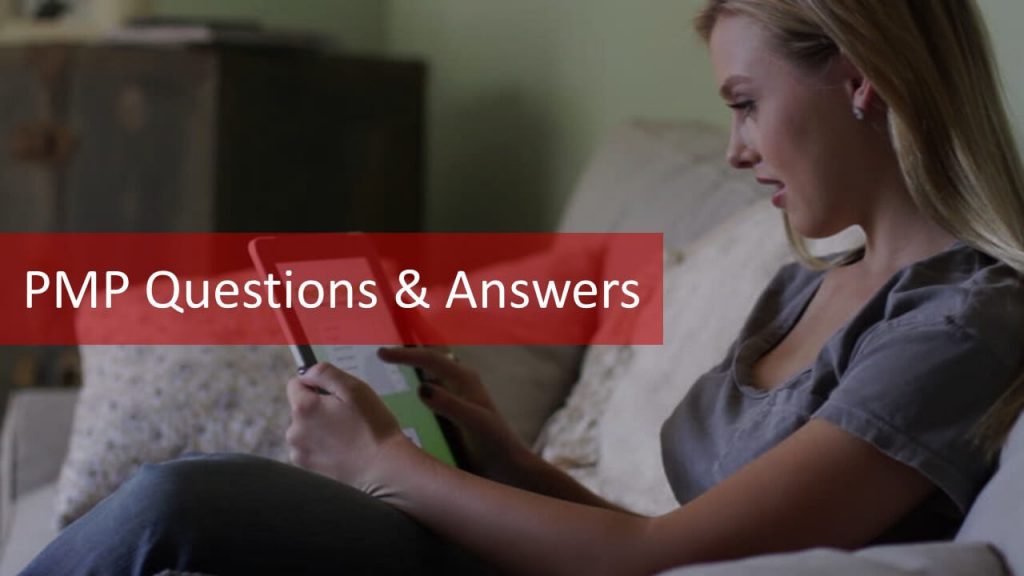
PMP exam questions assess your technical knowledge, your theoretical knowledge and your practical experience as well. Let’s examine three different PMP exam questions for each of these categories now.
1- Sample PMP Exam Question – Assessing Technical Knowledge
During project executing, a team member comes to the project manager because he is not sure of what work he needs to accomplish on the project. Which of the following documents contain detailed descriptions of work packages?
A-) WBS Dictionary
B-) Activity List
C-) Project scope statement
D-) Scope management plan
Answer is A. WBS Dictionary. Work packages in a Work Breakdown Structure contain only nouns or a couple of words regarding a work or deliverable. Detailed information on what needs to be done, responsible, prerequisites, successors, due date etc. are included in the Work Breakdown Structure Dictionary.
PMP Knowledge Area: Scope Management Knowledge Area
2- Sample PMP Exam Question – Assessing Theoretical Knowledge
A schedule performance index, SPI, of 0.75 means:
A-) Project is over budget.
B-) Project is ahead of schedule.
C-) Project is progressing at 75% of the rate originally planned
D-) Project is progressing at 25% of the rate originally planned
Answer is C, project is progressing at 75% of the rate originally planned. A, is irrelevant because SPI is a schedule performance index. We cannot derive any conclusion about budget performance of the project with this index. B, is not correct because SPI is less than one, therefore, the project is behind schedule. And D, says that you have completed 25% of the work that you have originally planned, so it’s not correct. The correct answer here is C, because SPI 0.75 means, you have completed 75% of your work that you have originally planned.
PMP Knowledge Area: Cost Management Knowledge Area
3- Sample PMP Exam Question – Assessing Practical Experience
You are the project manager for a software development project. The project aims to create a new mobile application that provides a personalized fitness tracking experience for users. The project scope has been clearly defined, outlining the features, functionalities, and timelines for the application. However, during the development phase, the project team receives a request from the stakeholders to include a new feature that allows users to connect their fitness data to social media platforms. What should the project manager do in response to this request?
A-) Review the project scope and determine if the new social media integration aligns with the defined boundaries. If aligned, incorporate the feature into the project scope.
B-) Immediately include the new social media integration feature without further analysis, as it enhances the product scope and adds value to the application.
C-) Reject the stakeholder request, emphasizing that the project scope has already been defined, and any changes may impact timelines and resources.
D-) Initiate a thorough impact analysis on the proposed social media integration, considering its effect on project timelines, resources, and overall objectives before making a decision.
Answer is D. When a new feature is requested during the development phase, it is essential to conduct a thorough impact analysis to assess how the addition may affect the project. This includes evaluating the impact on timelines, resources, and overall project objectives. A careful analysis helps the project manager make informed decisions and ensures that any changes align with the project’s goals and constraints. Simply accepting or rejecting the request without understanding its implications can lead to scope creep, affecting the project’s success.
Knowledge Area: Scope Management Knowledge Area
You can see some PMP exam questions and answers in the video below:
During your PMP exam, you can mark questions to review later. Use this feature because many PMP exam questions will be tricky. If you are unsure about an answer, mark the question to revisit later. If time permits, you can review your marked questions and make sure you have selected the best possible answers.
Recap of this section:
There are 180 questions in the PMP exam and there will be three different types of questions assessing knowledge. You will have 230 minutes to complete 180 questions. You can read more in our PMP exam questions post.
Should I use PMP Exam Simulators?
PMP exam simulators and mock exam questions are popular tools for PMP certification aspirants. As mentioned earlier, practicing as much as possible is crucial for your PMP exam success. The more PMP exam questions you answer, the better prepared you’ll be for the certification exam.
A typical PMP exam simulator includes realistic PMP exam questions, answers, and rationales. When practicing with a PMP question bank, note your mistakes and review them repeatedly to improve your weak areas before taking the actual exam.
If you can score over 70% consistently on a reputable PMP exam simulator, you can confidently schedule your PMP certification exam.
Check out the Master of Project Academy PMP Exam simulator to see how it can help PMP exam candidates.
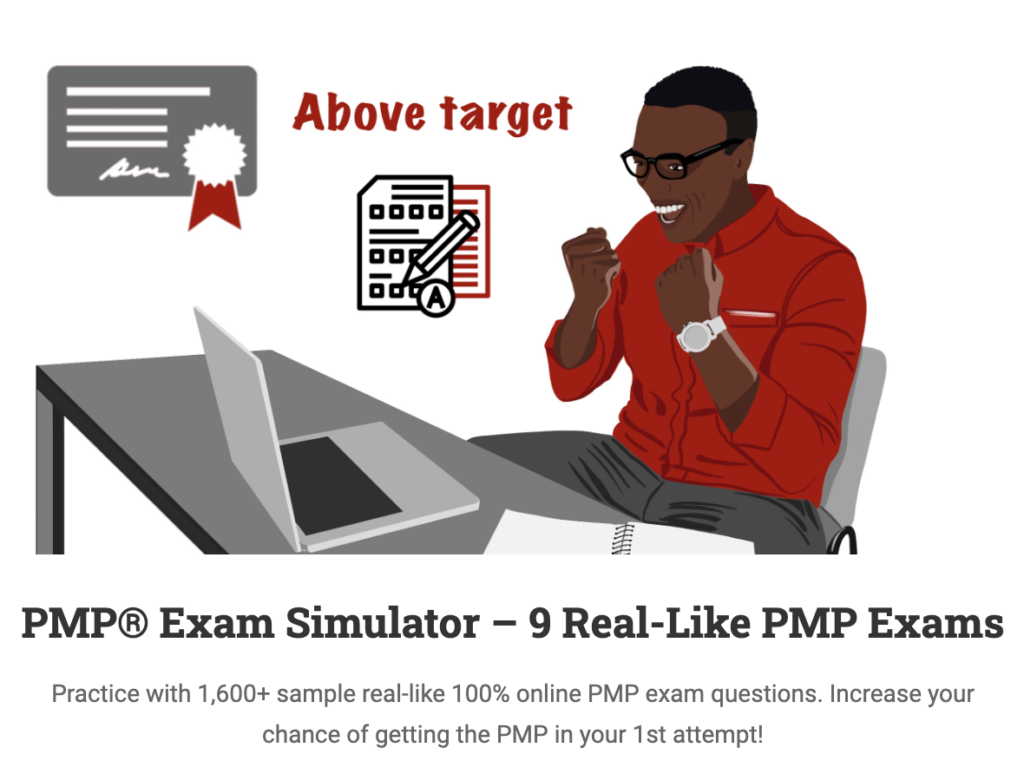
My recommendation is using a PMP exam simulator instead of PMP question bank for practice. Simulators offer a real-like examination environment with timer and other features, and they show results at the end of each PMP simulation exam with a percentage score.
Watch how the PMP exam simulator helps PMP exam candidates
My recommendation is using a PMP exam simulator instead of PMP question bank for practicing. Because these simulators will give you real-like examination environment with timer and other features and show results at the end of each PMP simulation exam with a percentage score.
How should I Use PMP cheat sheets?
PMP cheat sheets serve as valuable resources for PMP certification aspirants. They are you’re your secret weapon, offering quick access to key concepts and information you need for the exam. Unlike traditional study materials, cheat sheets are designed to help you in understanding and interpretation rather than simple memorization.
The content of a PMP cheat sheet typically includes essential formulas, key definitions, and important concepts across various knowledge areas such as project management processes, project constraints, and project performance indicators. These cheat sheets are organized in a logical manner, usually by knowledge area or topic, and can help to quickly retrieve the information during exam preparation.
For instance, a cheat sheet might include formulas for Earned Value Management (EVM), critical path method (CPM), and probability analysis, along with explanations of how to interpret the results generated by these formulas. Additionally, it may provide definitions of terms like CPI (Cost Performance Index) and SV (Schedule Variance), along with examples to illustrate their importance in project management.
FREE Resource: You can download our cheat sheet from the PMP cheat sheet post.
What are the PMP Certification PDU Requirements?
To take the PMP exam, you need 35 contact hours of project management education. Many people confuse “contact hours” with “PDUs” and look for free PMP PDUs to meet this requirement. Here’s a clear breakdown:
For PMP Exam Eligibility:
You need 35 contact hours of project management education. These hours must come from training provided by a project management expert or trainer. Simply reading a PMP book does not count towards these 35 hours.
For PMP Certification Renewal:
If you already have a PMP certification and are renewing it, hours spent reading project management books can count as free PDUs.
Key Differences:
- Contact Hours: Must be obtained from formal instruction by a qualified trainer. These are needed before you can sit for the PMP exam.
- PDUs: Can be earned through various activities, including self-study, and are used to maintain your certification after you pass the exam.
Professional Development Units (PDUs) are a crucial component of maintaining Project Management Professional (PMP) certification, as mandated by the Project Management Institute (PMI). PDUs are used to measure your ongoing professional development in project management. Here’s an in-depth look at PDUs:
Types of PDUs
PDUs are categorized into two main types:
- Education PDUs: Focus on enhancing your professional knowledge and skills.
- Giving Back PDUs: Focus on contributing to the profession and using your project management skills in various ways.
1. Education PDUs
These PDUs are further divided into:
- Technical Project Management: Learning about specific technical project management skills and knowledge.
- Leadership: Developing leadership skills that are applicable across various domains.
- Strategic and Business Management: Enhancing knowledge of industry and business management to align projects with organizational strategy.
Requirements:
PMP certification holders need to earn a minimum of 35 PDUs in education every three years. These PDUs must be spread across the three areas, ensuring a well-rounded professional development.
2. Giving Back PDUs
These PDUs can be earned through:
- Working as a Practitioner: Applying project management skills in your job.
- Creating Content: Writing articles, blogs, or books about project management.
- Giving a Presentation: Presenting on project management topics.
- Sharing Knowledge: Mentoring or teaching project management.
- Volunteering: Providing non-compensated project management services.
Requirements:
PMP certification holders can earn a maximum of 25 PDUs in this category every three years. The PMP certified professional can claim PDUs for engaging in professional activities that support and help grow the project management community.
PDUs Requirement Breakdown
To renew your PMP certification, you need to earn a total of 60 PDUs over a three-year cycle:
- Education PDUs:
The PMP Certification holder should earn a minimum of 35 education PDUs. These PDUs will be distributed as follows:
- Technical Project Management: At least 8 PDUs.
- Leadership: At least 8 PDUs.
- Strategic and Business Management: At least 8 PDUs.
The remaining 11 PDUs can be distributed among these areas as needed.
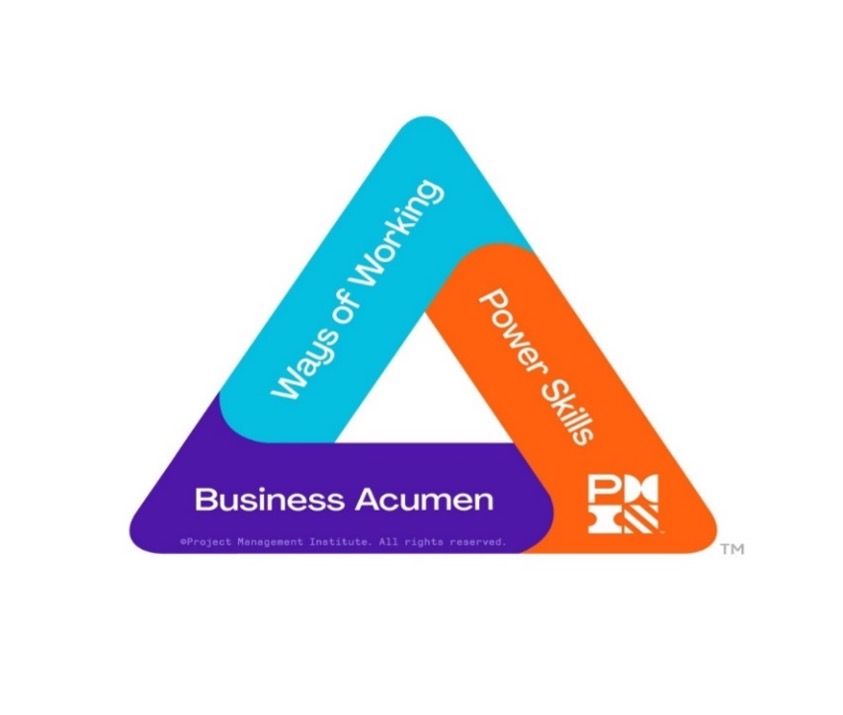
The PMI Talent Triangle suggests that an ideal project manager skill set should include technical project management skills, strategic and business management skills, and leadership skills. Therefore, a PMP certified professional is required to earn PMP PDUs, that align with these three categories of the PMI Talent Triangle.
- Giving Back PDUs
The PMP Certification holder should earn a maximum of 25 PDUs (from activities such as: giving presentations, creating content, volunteering, etc.)
As you see, other alternatives of earning PMP PDU from giving back category are creating content, giving a presentation, sharing knowledge and volunteering. These all require you to make additional effort compared to earning education PDUs. Therefore, especially if you are a working professional, we strongly recommend you to earn all 60 PMP PDUs by attending an PMP PDU online course. This is the hassle free, most convenient, and affordable way of earning 60 PDUs and renewing your PMP certification.
The following figure summarizes the first two PMP PDU requirements and PMP PDU limits for each PMP PDU categories.
You can read more in the PMP PDU Requirements post.
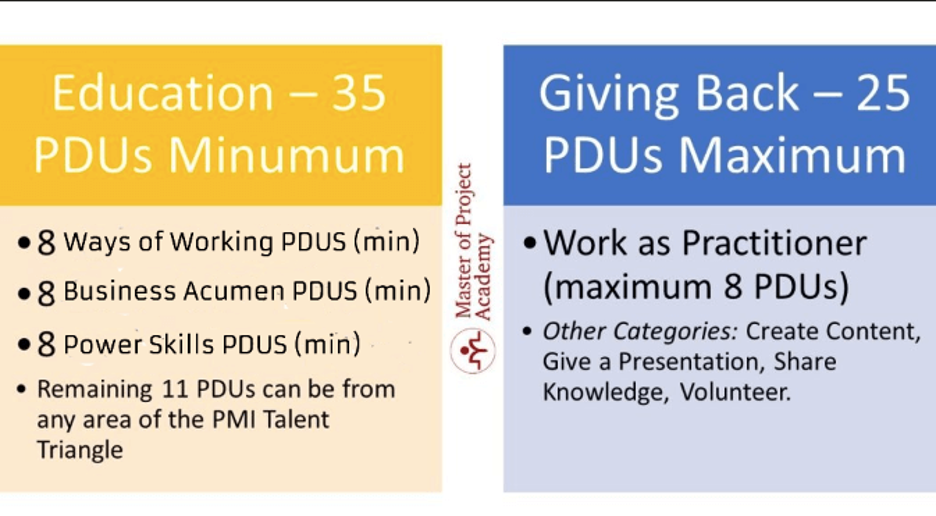
Recording and Reporting PDUs
The PMP certification holder should log the PDUs into PMI’s Continuing Certification Requirements System (CCRS) to ensure they count towards certification renewal. It’s important to keep records or proof of activities that contribute to PDUs, such as certificates of completion, registration receipts, or confirmation emails.
How can I earn PMP PDU?
There are several ways to earn PDUs for education and giving back categories. Let’s talk about how to get those points (PDUs) to keep your PMP certification active.
- Attending Courses and Training: Participating in classroom or online training sessions.
- Reading: Books, articles, or whitepapers that contribute to knowledge in project management.
- Watching Webinars and Videos: Engaging in PMI webinars or other industry-related video content. You can see online PDU options.
- Participating in PMI Chapters or Other Professional Organizations: Attending meetings, conferences, or events.
Note that, the easiest and most affordable way to earn PDUs is by attending PMP PDU Courses Online. Let me tell you why. Almost 100% of the PMP-certified professionals are full-time employees. Therefore, they use their free time to complete the CCRS cycle and renew their PMP certification.
If you rely on organization meetings, reading materials or informal learning sources, you will need to look for different materials and meetings to complete your 60 PDU requirement. However, if you find a good 60 PMP PDU Bundle, (the link takes you to the MoPA’s homepage) that offers PMP PDU Courses Online, it will allow you to complete the courses at your own pace. This way, you will not need to search for different resources to complete your PDU needs.
You can read more in the PMP PDU Courses Online post.
How can I renew my PMP Certification?
After studying hard, you passed the PMP certification exam and earned your certification. PMI will send your PMP certification to your mailing address and you will be able to see your certification in your profile on the PMI website.
But that’s not the end. You need to renew your PMP certification every three years to keep it valid. In order to do that, you need to earn 60 PDUs (Professional Development Units) every 3 years.
Here are the five steps to renew your PMP certification.

Step #1 – Earn 60 PDU (Professional Development Unit): One PDU equals one hour of project management education or practice. You need to earn 60 PDUs within three years after getting or renewing your PMP certification. PMI has different categories for PDUs with specific rules and caps. You can learn more about this on the PMI website. Once you earn PDUs, claim them through the PMI website to update your certification status.
Step #2 – Fill in the PMP Renewal Application: After you earn 60 PDUs to retain your PMP certification, login to PMI website and fill in your PMP renewal application form.
Step #3 – Confirmation to PMI Code of Ethics: After submitting the renewal application, you will need to confirm your agreement with the PMI Code of Ethics. Confirm this to proceed.
Step #4 – Pay the PMP Renewal Fee: After confirming the Code of Ethics, you must pay the renewal fee. The fee is $60 for PMI members and $150 for non-members.
Step #5 – Receive Confirmation of PMP Renewal: Once you have paid the renewal fee, PMI will review and confirm your application.
Then, you have to keep on earning PDUs to retain your PMP certification for the next three years. You can read more in the PMP renewal post.
How can I earn FREE PMP PDUs?
Did you know that 80% of professionals who are related to PMP certification are confused about what PDU is? Before we discuss how to earn free PMP PDUs, let’s clarify common misconceptions about PMP PDUs.
One of the PMP certification requirements is completing 35 contact hours project management education, which you can achieve by attending a PMP training. However, many PMP aspirants confuse the contact hours with PDUs. That is why many search for “35 PDU PMP training” or “Free PMP PDU training” to satisfy project management education requirement for the PMP certification.
You need to earn 60 PDUs every 3 years to renew your PMP certification. There are several ways to earn PMP PDU. You can attend a training session, a webinar, online PMP PDU courses, conferences, or reading or authoring books. There are many other ways to earn PDUs for renewing your PMP certification.
Finding Free Resources
It is difficult to find free resources that fully cover the required 35 contact hours of project management education. Even if you do find them, they might not be comprehensive enough to prepare you for the exam.
We offer both free PMP PDUs and free contact hours to help you meet these requirements.
Enroll in our FREE PMP training and earn 0.5 contact hours for free.
You can earn four free PMP PDU from education category if you follow the directions in our PMP PDU podcast post.
You can read more in the Free PMP PDU post.
How can I earn PDUs from PMP PDU Courses?
If you attend and complete a course or training related to project management, PMI accepts these as PDUs. Following activities go under the category of course or training.
- Educational events held by a PMI chapter
- Face-to-face, instructor-led courses from PMI Seminars World
- e-Learning On Demand courses –> PMP PDU Courses Online goes into this category.
- Academic education through programs accredited by the PMI Global Accreditation Center (GAC)
- Training courses offered by a PMI Registered Education Provider (R.E.P.)
- Courses from other third-party providers
PMP PDU Courses Online provides you the PDUs you will need to renew your PMP certification. Once you completed the courses, you can claim your earned PDUs as instructed in the PMI PDU Submission post.
You can read more in PMP PDU courses online post.
How can I earn PDUs from PMP PDU Courses?
You can earn PDUs (Professional Development Units) by attending and completing courses or training related to project management. Here are the types of activities that qualify:
- Educational Events: Attend events hosted by a PMI chapter.
- Instructor-Led Courses: Participate in face-to-face courses provided by PMI Seminars.
- Online Courses: Take e-Learning on Demand courses, which include PMP PDU Courses Online.
- Academic Programs: Enroll in academic programs accredited by the PMI Global Accreditation Center (GAC).
- Registered Education Provider (R.E.P.) Courses: Join training courses offered by PMI Registered Education Providers.
- Third-Party Providers: Complete courses from other recognized providers.
PMP PDU Online Courses are particularly convenient for earning the PDUs you need to renew your PMP certification. After completing the courses, you can claim your earned PDUs by following the instructions in the PMI PDU Submission post.
You can read more in the PMP PDU courses online post.
How Much Do Project Managers Earn?
The salary of a Project Manager can vary depending on several factors. The top three factors that typically influence a project manager’s salary include:
- Location: The geographical area where the project manager works can significantly impact their salary.
- Experience and Skills: A project manager’s level of experience and the specific skills they possess can also influence their salary.
- Industry: The industry in which the project manager works can affect their earning potential.
Project Manager Salaries in the US
In the United States, project manager salaries can vary based on the city and industry. On average, project managers in the US earn around $80,000 annually.

However, if you look at project manager salaries in San Francisco, you will see that the average is 31% above the national average.

It is evident that Project Manager salary increases in proportion to their experience and skills. Below is the average salary for Senior Project Manager in the US.

How Much a PMP-Certified Project Manager Can Earn?
PMP is the world’s #1 project management certification. How does having a PMP certification affect the salary of a Project Manager?
If you are PMP-certified, you can expect up to a 20% increase in your salary compared to a non-certified project manager. This figure is supported by the PMI salary survey, 9th edition, indicating a clear salary growth for those with PMP certification.
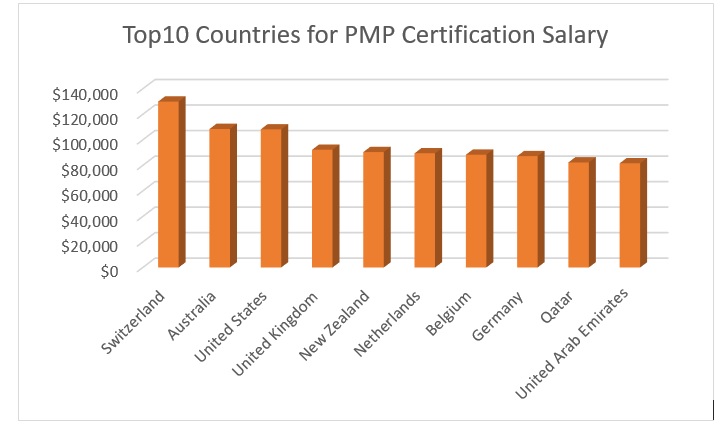
From the chart above, you can see that Switzerland offers the highest salary for PMP-certified professionals with the United States ranking third and the United Arab Emirates tenth on the list. What is the basis of this PMP certification salary survey? The basis of this PMP certification salary survey is data from 26,000 project managers across 34 countries who reported their salary changes after earning their PMP certification.
In the United States, PMP certification can boost your salary to approximately $111,000 per year, compared to around $80,000 per year for those without the certification. Globally, the median salary for PMP-certified professionals is about $81,000 per year, depending on the various roles and experience levels. On average, you can expect a 20% salary increase with PMP certification, according to the survey results.
You can read more in our PMP Certified Project Manager’s Salary post.
Conclusion
We called this post The PMP Certification Bible, and it certainly deserves the title. Starting from the history of PMP certification and PMI, we have covered every detail of PMP certification process.

We have listed three major benefits of PMP certification: a common language for project management, a salary advantage and an edge in project management jobs screening.
Then, we have detailed the PMP exam requirements. including both the project management experience and education requirements for PMP certification.
We have explained the PMP application process and what to expect if you undergo a PMI Audit.
There are three major components of PMP certification cost: PMP training cost, PMP exam fee and time you invest to get ready for the PMP certification exam. We examined each of these three cost aspects thoroughly.
No doubt, you will need a solid PMP study plan to crack the PMP certification exam. After helping 200,000 professionals in 180+ countries around the world, we prepared a 7 step PMP study plan, and we detailed each step in this post.
Many PMP certification aspirants look for the best way to study for the PMP exam. While there is no one-size-fits-all approach, we provided tips to help you find your best study method to pass your PMP certification exam.
We reviewed the PMP exam structure, and different types of PMP exam questions and provided a link to free PMP mock exam questions as well.
Finally, we have outlined the steps for the PMP renewal process.
Note that this guide has been prepared with the knowledge and experience of helping 300,000+ professionals pass their certification exams.
